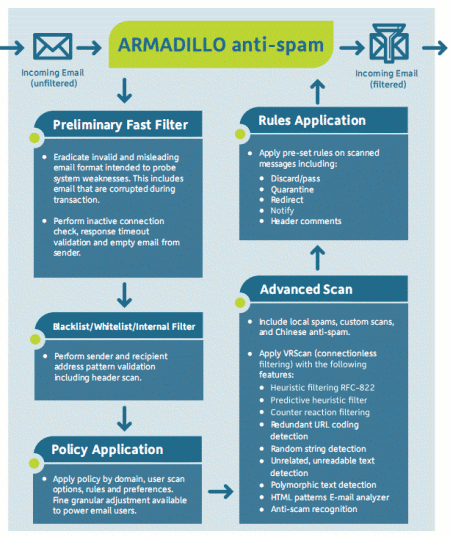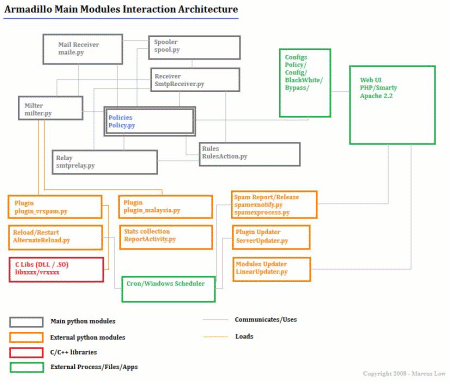Enovad Used Python to Deliver its Armadillo Commercial Anti-Spam Software
| Category: | Business |
|---|---|
| Keywords: | cpython, ide, spam |
| Title: | Enovad Used Python to Deliver its Armadillo Commercial Anti-Spam Software |
| Author: | Marcus Low |
| Date: | 2009/04/08 02:03:48 |
| Website: | http://www.enovad.com/ |
| Summary: | Python helps Enovad deliver the feature-rich Armadillo commercial anti-spam product ahead of schedule. |
| Logo: | 
|
Introduction
I have been programming in C and C++ since 1994 and have led many teams in Windows system programming. In 2007, in the context of the Armadillo anti-spam software project at Enovad, I was given the requirement that the software must run both under Windows and Linux.
To do this, I had to re-train my team of seasoned Windows system developers to also be able to deliver a product on Linux. I chose to re-evaluate the tools and programming language available to me, and this led to my investigation of Python as a cross-platform development solution.
About Armadillo
The Armadillo project is an SMTP email filtering proxy that works across multiple domains and platforms. The project came into being to satisfy the needs of partner businesses that produce Windows email servers and provide email hosting with an anti-spam and virus filtering proxy.
We considered using and improving on an open source email server but ran into trouble making them work on Windows. Most of the mail servers with significant anti-spam development (see milter.org) are strictly Unix/Linux-based. Porting them to Windows looked too difficult. SendMail, for example, uses a process instance model that won't work well on Windows, while some of the mail storage formats employed (such as maildir) rely on characteristics of Unix filesystem implementations to perform well.
Armadillo is based on some filtering components that we had written previously and some that we could license from a third party. All of these were written in C and available only as a C library.
The filtering SMTP proxy consists of a smart spooler, plugin architecture for filtering libraries, spam/virus report generator, receiver, relayer, policy object for multiple independent domains, monitor object, and a web configuration GUI that runs on PHP in Apache and IIS.

Overview of the Armadillo Spam Filtering Process Zoom in
Why Python?
We did consider C# since "Mono" supports it and the guys here were already well-versed in C# development on Windows. However, we lacked confidence that code developed on Windows would work equally well on Mono, and all development would need to actively avoid API that would be missing on Mono. The differences in stability and feature set of the IDEs on Windows and Linux was also an issue. As a result, we looked at other options, including Python.
At the time of our investigation, Python had reached version 2.5, and a what we felt was a credible level of maturity. While not a "main-stream" choice, Python was attractive because of its cross-platform abilities and the productivity I felt the language could bring to the team.
Some of my team members were skeptical and preferred the tried-and-true power of C/C++ for systems programming. We decided that those members would work on the web GUI for configuration of the product, while the rest of us would use Python for the other components.
Implementation
We chose to implement Armadillo in an asyncronous style, rather than using threads. Initially we planned to use Twisted, a popular framework for asyncronous programming. However, upon conducting some stress tests, we found that the Python standard library module asyncore was not only robust and fast enough but also easy enough to use for our purposes.
A number of the other standard libraries were also used, and we made use of some of the Python recipes provided by ActiveState. The C filtering libraries that we integrated into the project were wrapped as extension modules.
For a development environment, we used Wing IDE as the preferred IDE. While our test machines ran both on Linux and Windows, we were able to do all our primary development on Windows, with Wing IDE.

Overview of the Armadillo Architecture Zoom in
Nose tests and the standard library module unittest gave the project a strong unit testing foundation. This was a crucial component of our development process that helped us maintain high code quality.
One minor feature of Python development that was really a blessing was the ability to quickly test text processing code or coding assumptions in the interactive Python shell.
Outcome
Four months later, the team was surprized to see the filtering product completed three months earlier than we expected had we used C/C++ for the whole project.
The feature set at this time included: Filtering anti-spam/virus with support for independent policies across multiple domains, robust 24x7 operation with low resource usage, self-generated spam reporting, anti-DoS (denial of service) capabilities, plug-ins for English and Chinese anti-spam as well as localized spam filters, SMTP-authentication proxy for AUTH LOGIN/PLAIN that could relay to popular SMTP servers transparently, and it all ran on both Windows and Linux.
We have since successfully licensed the product to a number of companies and beat popular branded competitor products in reviews. The product stands as a testament, at least to the team here, that Python is viable for commercial systems-level development and not just a scripting language.
Python is now a preferred language at our company for any systems development projects -- except, of course, device drivers!
About the Author
Marcus Low (marcus at enovad dot com) is the R&D Director for Enovad, Malaysia. Marcus is the co-founder of InternetNow and have been actively involved in anti-virus and personal firewall development with C/C++ since 1994. He is also the founder of the Malaysia Python User Group.

